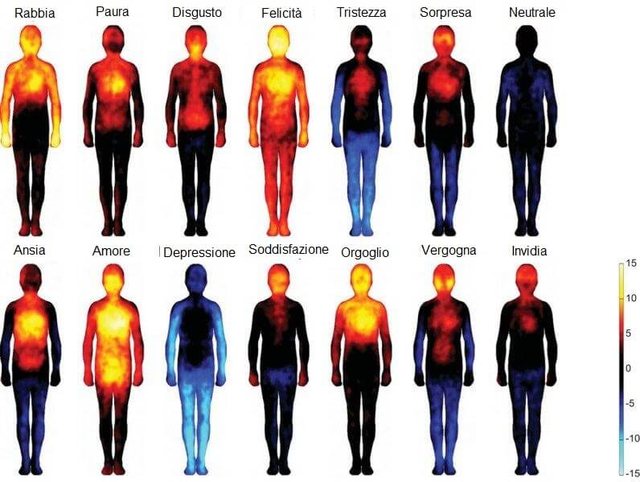
Can you describe what the emotions are? According to the Encyclopaedia Treçani, it is possible to determine emotion as an "internal process evoked by an event". This is what makes it different in relation to a feeling, which is a subjective experience without the presence of an incentive. The emotions we experience are related to a physiological change that is accompanied by a response from the nervous system, in which the hormonal and electrocortic interactions interact.
Emotional effects have an effect on our body and they are followed by changes in heart rate, blood pressure, breathing, and even body temperature. It is something that each of us can understand, because when emotion covers us, it's not just a psychological experience: we live this situation with the whole body and today, thanks to research, scientists are discovering valuable information on how emotional impact affects the health of the organs by influencing in an important way the well-being of the person.
What can we learn from the emotions? Here is what famous authors explain that reborn sensation for emotions considered negative. It is important to remember that emotion is neither negative nor positive: we consider it an emotion and we often categorize it based on what we experience or what happens in our lives as we live.

Emotions and body
According to the principles of ancient Chinese traditional medicine, each emotion gene corresponds with the different parts of the body that affect the health of each organ. This concept actually originates in ancient times and is found in different cultures. Today, thanks to more and more brain studies, neuroscientists invite us to review the role of emotions.
- Happiness affects the heart
In ancient Egypt, the heart was considered a place of life. Joy, which in Chinese traditional medicine is associated with this body, immediately brings to mind the immersion in the heart that we experience in moments of great intensity, however this energy can also become a state of overload. When we feel worried, "the heart beats faster" and thoughts are difficult to put in place. How many times have we felt victims of an emotion that closes our heart?

- Anger affects the liver
The liver produces bile, which in turn promotes the process of sucking the fat into the intestine. The liver takes care of cellular nutrition, metabolizes what enters our body, eliminates and destroys the debris. Its precious function as a symbolic level filter makes one think of the delicate balance between entering what is good for us and producing what is not necessary.
This happens in the physical plane, but also on a psychological level, something very similar happens: we need time to metabolize, to distribute what is likely to be intolerable. Anger can be a real poison, and for years it tears our thoughts, invades the mind like a nail. How can we do to liberate the energy of anger in a creative way? Start by honestly telling what makes you feel frustrated and helpless: accepting what you feel is the first step to not feel that burden on your stomach.
- Fear affects the kidneys
In Huang Ti Nei Ching Suen, a treatise that contains thousands of years of Chinese medicine, is written since we are afraid, energy is no longer circulating. Terror blocks the flow of IQ, vital energy: in fact we feel paralyzed. Kidneys help in filtering blood, eliminating waste and regulating blood pressure. Fear, like anger, constitutes an adaptive response of the organism strongly bound to survival. This feeling speaks of the security needs of every human being and our survival instinct, but also our fear of being abandoned and hurt at a psychological level.
- Sadness hits the lungs
According to traditional Chinese medicine through the heart, sadness touches the lungs: the body that allows us to breathe and continue to stay alive. In the approach studied by Claudia Rainville, the lungs represent life. When the joy of living fails, it is as if they involve us in a deep exhaustion.





